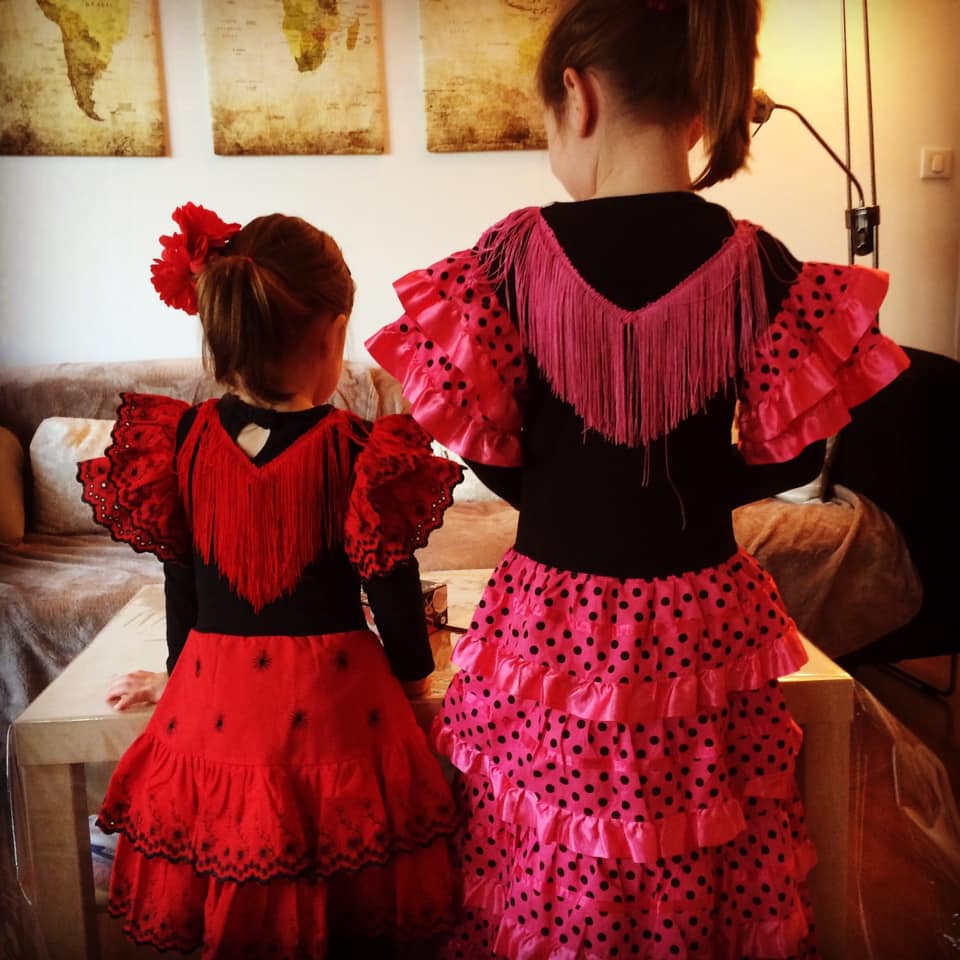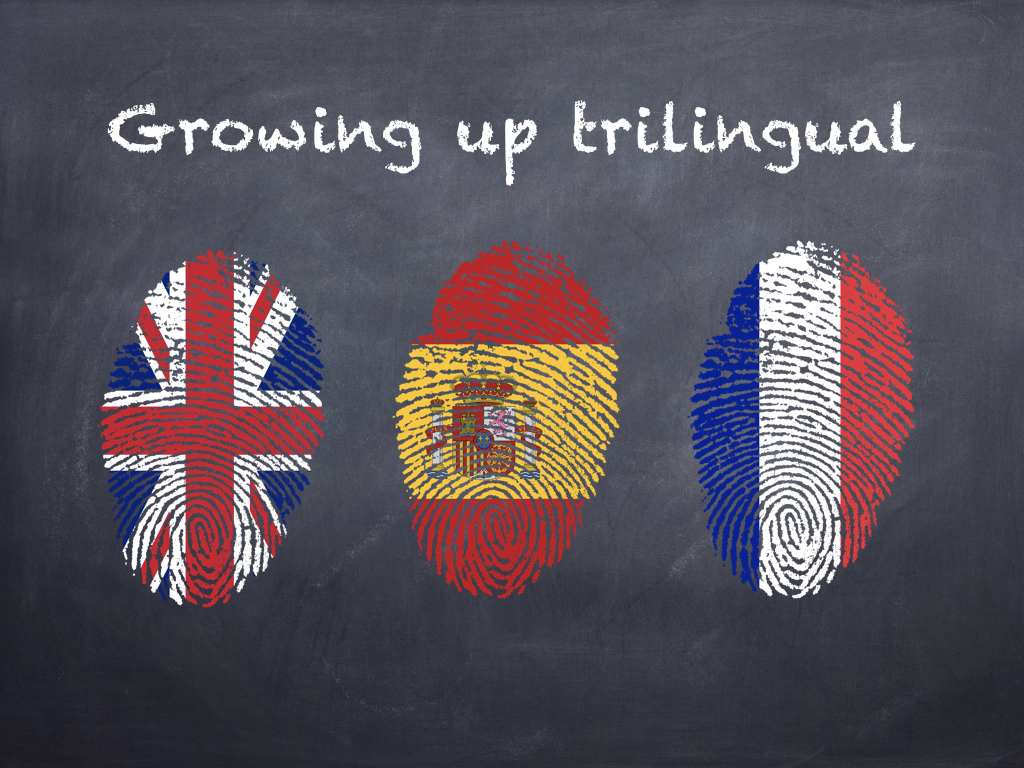Amy González is a mom who raises two trilingual girls in France. In this interview, she shares her story of creating a “Spanglish Embassy”—an environment inside her home that allows her to fully immerse her two girls in the two minority languages. You can read more experiences from her trilingual journey on her blogs Our ml home and Notre Maison Bilingue.
Mom, Dad, children=French (majority language), Spanish & English (minority languages)
_____________________________________________________________________________________________________________________________________
Veronika: Many thanks for the interview! My first question is: what is the situation in your home? Who belongs to your family? Who speaks what language, to whom, and when?
 Amy: I’m French. I was born in France. Since I was 10, I lived abroad. My parents moved to Spain and my dad thought, “If I put my daughter in an English school, she will be trilingual in no time.” And he was right! So I speak French, English, and Spanish. Fast forward to now, I’ve moved back to France and I met my husband who speaks Spanish. He had come to Paris for work. And now we have two daughters. Basically, my husband speaks Spanish to our daughters and I speak English to them.
Amy: I’m French. I was born in France. Since I was 10, I lived abroad. My parents moved to Spain and my dad thought, “If I put my daughter in an English school, she will be trilingual in no time.” And he was right! So I speak French, English, and Spanish. Fast forward to now, I’ve moved back to France and I met my husband who speaks Spanish. He had come to Paris for work. And now we have two daughters. Basically, my husband speaks Spanish to our daughters and I speak English to them.
Family rule: No majority language at home!
We do not use French at home anymore. We began with OPOL with French as a communication language for the family and it didn’t work out for us. My eldest was passive. She understood everything, but she would only use French. So basically 2 ½ years ago, we said, “We’ve got to change”. And we switched to minority languages at home. My husband still speaks Spanish and I still speak English, but French is absolutely not allowed in our home. There are exceptions for calls, visits, and so on; but our daughters know that with us, it’s English or Spanish, no French.
Veronika: So you basically have OPOL—one parent, one language—with two minority languages?
Amy: Yes, exactly. There’s absolutely no majority language anymore.
Veronika: Do the kids actually stick to it?
Amy: Yes, they do. My eldest still has a strong bias for French, but she knows she’s not supposed to speak French. She very, very rarely does it. She knows she gets that look from me. She only does it if she does not find a word in English. And even then, I have told her, “If you know it in Spanish, I’d rather you tell me in Spanish first.” French is really the last resort. I feel that we need to push her out of her comfort zone a little. She likes to be comfortable. I think that’s a result of what we had originally, the classic OPOL with French as the family language. She was comfortable with French and she did not even try to speak in Spanish or in English. That’s why I push her now.
Veronika: How old are your daughters?
Amy: My eldest is 6 ½ and my little one is 3.
Veronika: Okay. When children are little, it is usually a lot easier. Once they are older and used to a certain way, it becomes more of a challenge.
The older children are, the more challenging it will be to switch the language of communication with them
Amy: Exactly. My eldest was already 4 when we changed and that was a bit challenging. We did manage to make the change but it was a bit of a struggle. At first, I just tried… Well, basically when we became parents, we didn’t look up bilingual education bit arrogant maybe but… I was trilingual. It was natural and I had never seen a child resist a minority language. So being multilingual was normal because all of us were like that. It wasn’t anything special. It wasn’t a big deal.
 So I didn’t look up anything and then when things didn’t work out, I started getting very concerned especially with regard to Spanish. To be honest, as much as we would love her to speak English for her own benefit in the long run, I’m still French and I can’t pretend I’m British. More important is Spanish though. That’s really, really important and I will not let go. She has to speak Spanish because we have family over there and they would be so upset not to be able to communicate with her.
So I didn’t look up anything and then when things didn’t work out, I started getting very concerned especially with regard to Spanish. To be honest, as much as we would love her to speak English for her own benefit in the long run, I’m still French and I can’t pretend I’m British. More important is Spanish though. That’s really, really important and I will not let go. She has to speak Spanish because we have family over there and they would be so upset not to be able to communicate with her.
Veronika: I see… well, English is something she may also pick up through school education, right?
It’s important to have a rationale and clear goals for raising children bilingually.
Amy: Yes, she would, but in France—I don’t know about other countries— France and Spain don’t have a very good reputation when it comes to teaching foreign languages at school. So far I haven’t met a person here or in Spain who comes out of high school and is bilingual. There might be, but they are not really comfortable if they have only learned it at school. We wanted to give more to our daughters.
Veronika: Yeah, that makes sense. So your rationale for having them grow up with 3 languages is basically connection with family and also a leg up in life?
Amy: Exactly, giving them the same chance I had. Originally, I hadn’t planned on bringing up my daughters in English. Having a Spanish husband, I thought Spanish is a priority and that’s two languages already. English just came up like that. My husband said, “What if you bring them up in English?” I said, “Well, why not? But isn’t it too much?” I wasn’t sure. My husband’s family was very supportive, saying, “Yeah, you should.” So I just started. Just like that.
Language is at the core of the relationship with our children. So use a language with your child that you feel comfortable with.
Veronika: Have you ever felt any kind of emotional concerns? Usually language is tied to emotions when you bring up a child. With English not being your native language, have you felt any issues from an emotional point of view?
Amy: Emotions for me or emotions for my daughters?
Veronika: Maybe both of the above. Usually as moms, we have a certain emotional bond with our children. That connection is usually established and maintained through language. So I was wondering if you’ve experienced any…
Amy: No, I love all my languages. It reminds me of my childhood. So even though it wasn’t the language my mother brought me up in, it wasn’t a concern. I just love English and I love Spanish. So I’m quite happy to use both languages. And then my daughters…well, my little one has a strong bond with English. I hear her playing on her own and singing on her own in English. When she has a choice of three languages, she roots for English. She’s happy with English. For my oldest, I think we reacted too late. Us switching when she was already 4 years old, was too late.
Making tough decisions is part of bilingual parenting
And I think schooling in French doesn’t help. I think it also has to do with personality. My little one is a lot more emotional and my eldest is very headstrong. She just says the opposite just for the sake of it. But I guess a lot of kids do. I think she is too small to understand why English might be good for her. That’s why I made the decision for her because she’s too young to know what’s going to be a good for her in the long run.
Veronika: Sometimes kids come around in their adolescent years or in their early 20s when they realize how much of a value an additional language is.
Amy: It is. We don’t realize. And to be honest, I’m really grateful to my dad for the idea. I’m often very sad because I didn’t have time to thank him but thinking back … raising me with multiple languages was the best thing he did for me.
Veronika: That was pretty progressive and visionary at that time, I would say.
Amy: It was! Completely!
Veronika: So coming back to your children, what do you do on a regular basis to expose your daughters as much as possible to the minority languages?
Amy: Well, when we are at home, there’s absolutely nothing French from the moment we walk through that door. When I’m outside with them, I speak in English and my husband in Spanish. But then there’s French around us. From the moment we walk through the door, everything is in English or Spanish only. I always have television or radio in the background. Even though they’re not looking at it, there’s always a background in these languages because I think it really influences the language you use. I know when I hear a language, if it is a language I speak, I will switch to that language instinctively without necessarily planning it. So I do create that language environment in the background.
Reading with children in the minority language is key!
Oh and another thing I do: a lot of reading at night! I think my little one had me read five stories the other night and I eventually had to call dad to the rescue because I thought I was going to end up voiceless. Reading together is important! It is a moment that we snuggle up. We read together and enjoy that. I do play with my daughters when they come up to me. I’m trying to establish a “Spanglish embassy”. As much as I love France and I love French, it’s just not possible to deal with it at home. I’ve discovered it. At least at the moment, it’s not possible. So basically everything, every interaction, is in English and Spanish. So it’s like trying to recreate that language environment… I can’t fly them to London or Spain every night. But by trying to do that, when they walk home, we’re like in another country and I try to immerse them in those minority languages.
Veronika: That’s interesting.
Amy: Everything, every routine—brushing their teeth, putting their pajamas on, cooking dinner—everything is in English or Spanish.
Veronika: Are you a stay-at-home mom or are you working?
Amy: No, I work.
Veronika: So how does that work in terms of time to expose your kids to the minority languages? You are sharing the limited number of hours you are with your kids per day between Spanish and English at home, right?
Provide children with as much exposure to all languages as possible!
Amy: Well, it is obviously challenging. I know that they speak more French out there. They are basically with their childminder or at school 10 hours a day. I calculated it. They are awake about 13 hours a day. So they spend 10 hours with French. Calculating it is kind of interesting! It’s an eye opener too. They spend 3 hours with us and mostly with me because my husband works relatively far away; so he comes home later. So I’ve got a slight advantage with regard to English. But now I do tend to read books in Spanish too. I’ve become a bit more flexible as well over time. So there’s always a little bit of Spanish even though my husband may not be there.
Obviously it’s a bit like David in front of Goliath, isn’t it? We’ve got like 10 hours of French. It’s their social life too. They have got their peers speaking in French. And then we’ve got 3 hours per day with the minority languages. So it is not that much. We don’t split English and Spanish in a rigid way. We each speak our language. So my husband sticks to Spanish and I stick to English. But we are also all flexible. So if they pick a book that happens to be in Spanish, I do read it in Spanish now. There was a time when I used to translate Spanish books into English as I was reading them. But then I realized my little one had a stronger bond with me and I could tell Spanish was lagging behind.
Be committed but flexible to accommodate needs!
So we started rearranging a bit how we went about our ways. For example, taking the kids to bed and reading bedtime stories. Before, it was always me. But then we managed to convince my younger one that her daddy can read bedtime stories too. So we try to take turns reading at night. So now her exposure is a lot more balanced. Also, I stopped translating the Spanish books into English. When she realized that, she was very shocked. At first she said, “Spanish mummy, Spanish?”. She was just a bit older than 2 and she realized. She understood there was a change and at first it was, “No, no” and I said, “Yes, yes”. Eventually, she came to terms with it. Now her Spanish is just as good as her English.
Veronika: That’s a good approach! Try to be consistent without being rigid. So remain flexible and work as a team. To be honest, raising a child with two languages as a working mom and the main person who speaks the minority language has already been quite a task for me. So I can barely imagine how to make it work with another language on top of that…
Amy: It is complicated. Sometimes I see in bilingual parents groups on Facebook or in forums, “Oh, I would like to raise my kid trilingual” or some say like four languages. And sometimes they’re not necessarily heritage languages. I try to always give a word of caution. I say it’s brilliant, but it is challenging, three languages. I mean, I can’t say I regret it, but it would have made my life a lot easier if we had stuck to Spanish only.
Veronika: I can believe that! It’s a constant work-in-progress.
Amy: Yeah. So it is complicated to balance out all these languages.
Veronika: True! Okay, final question: what advice would you give to other parents who are either wanting to embark on a bilingual journey or those who are already on the journey?
As parents we are language role models!
Amy: I would say: live the language! Don’t think, “Tonight, I’m tired. I’ve had a long day at work and I can’t be bothered to read 10 books in the minority language. I can’t be bothered to speak the minority language”. You have to really, really push yourself all the time, tired or not. It’s really living the language as if you were in your minority language country and not miss out on any minute of exposure. It’s also about setting an example. Children look up to us and it really struck me with bilingual education, to be honest. My eldest only spoke French, but when I stopped interacting in French. I think she just picked up on that, and the minute I started just speaking English, she tried speaking English. They look up to us. The little one had a preference for English and the minute I started reading books in Spanish, she started using a bit more Spanish.
Be consistent—even when it’s challenging!
So all this is really important: living the language, creating exposure, and setting an example. You really have to commit. The bilingual journey has highs and lows. It’s not all wonderful. There have even been times when I shed a tear, saying “It is too hard. What did I get myself into?” So it’s not easy. But as long as you’re aware of that, you’re determined, and you won’t give up even when your child is answering back in the majority language, just keep going. In the long run, it will work out. You might have to adapt your original strategy. But the important thing is to keep going.
Veronika: That’s a good point! On that note: thank you so much for taking the time.


1 comment
[…] Should you be interested in reading this interview, visit ““The Spanglish Embassy”: Creating an Immersive Minority Language Environment”. […]